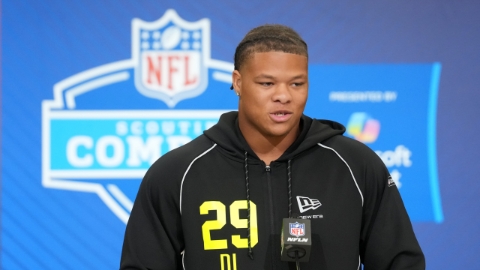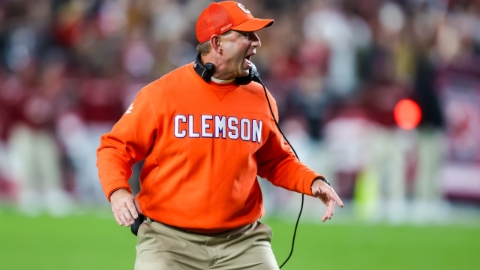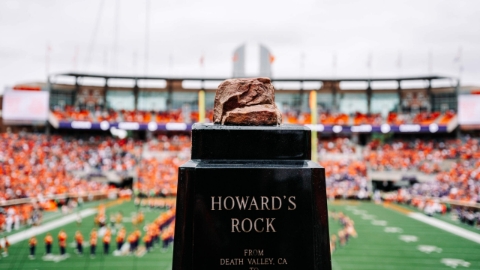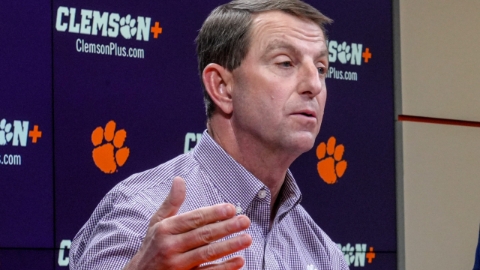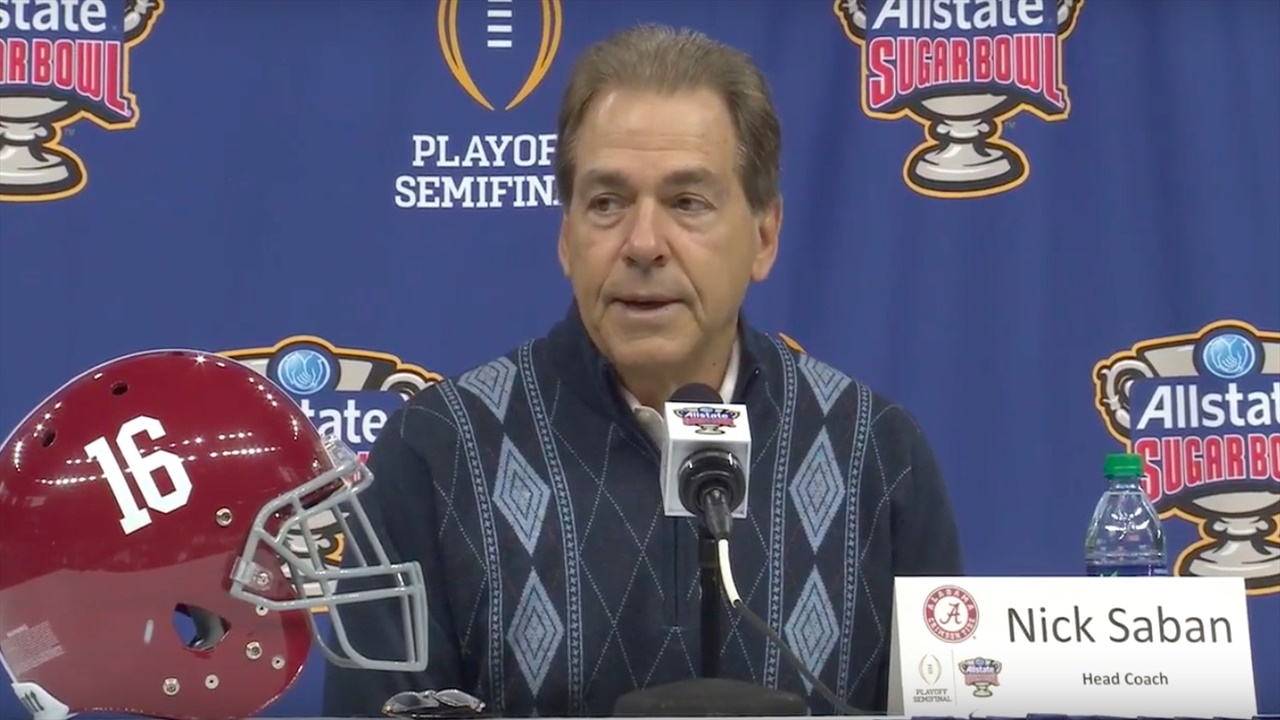
First of all, wish everybody a very Happy New Year. I know this is a time for resolutions, and what really are resolutions? It's things that we want to do in the future. So we're trying to be pretty obsessed with what we're trying to get done here in the next couple days.
I would also like to make mention of the fact that this has been a very good experience for us. The Sugar Bowl folks have done a wonderful job, the city of New Orleans, and everything has gone extremely well from an organizational standpoint, from our standpoint. And we certainly appreciate that.
But we're here to play a game, and our players have done a really good job of trying to prepare for this game. And we're going to continue to do that for the next 48 hours and, hopefully, be able to play very well in this game.
This being the third straight year that you've played against Clemson, is there anything distinctive you notice about [Coach] Dabo [Swinney]'s teams?
Well, first of all, I think [Coach] Dabo [Swinney] does a fantastic job with his team. He's got a really good coaching staff. I think they're very innovative in some of the things that they do offensively, which makes it very hard for them to defend. I think they do a very good job of utilizing the personnel that they have on offense. They're very talented on defense, create a lot of problems for you, very aggressive in how they play. They've got some really good players, but those players play extremely well. And they're very solid on special teams and everything they do.
So, when you look at their team, it's hard to find a lot of weaknesses in terms of what they do and how they do it and the consistency that they do it with. So I just think this is a really good program, very well-coached. I think Dabo [Swinney] has great leadership in terms of how people respond to him. And you can tell that by the way his team plays.
When you see Clemson this year on tape, what stands out about their wide receivers, specifically Hunter Renfrow?
Well, Hunter Renfrow is a pain in the you-know-what in terms of nothing different from last year to this year. The guy is very quick, very instinctive as a player, knows how to get open, makes the right decisions, really kind of a go-to guy for them on third down, especially in the third and 4 to 6, 7 range. So very, very crafty, very quick, but very smart in terms of how he plays.
And he's been, really, a consistent, effective player for them. And I think, when I made the statement earlier about how they utilize their personnel -- to me, receiver core is a little bit like a basketball team. You got to have a point guard; you got to have a shooting guard; you got to have a power forward. I think that's one of the things that they do really well with their wide receiver core in terms of how they utilize their guys. And they utilize him extremely well. And he's very effective at how he does what they ask him to do.
Nick, where has Jalen [Hurts] grown the most as a quarterback and a leader?
I think Jalen [Hurts] has improved dramatically from last year to this year. And I think his consistency and performance throughout this past season was a lot better, especially in the passing game. Jalen has always been a guy that, because of his athleticism and his ability to run the ball, has made a lot of plays with his feet. But I also think that we've been able to help him develop as a quarterback in terms of his decision-making in the pocket. And, when he has done that well, he's been extremely effective. And he's been a little more consistent at doing that well this year. And we hope that we'll be able to continue to build on that for him in this game.
The last month, obviously, you've been able to get these guys on the defense healthy. But on the offensive side, have you seen the development you'd want out of your wide receivers in the last month to give somebody to complement Calvin [Ridley] on the outside?
Well, first of all, we have gotten a few players back on defense. But we also lost Hootie Jones in the
Auburn game, Shaun Dion Hamilton, who was a signal caller on defense. We lost Dylan Moses, who really kind of took his place. So we've kind of gained a few and lost a few. But it's a new mix of people and a new chemistry of how those guys are going to work together in this game. And I think that's extremely important in terms of communication when you play against no-huddle-type teams.
Offensively, you know, I think we have other weapons on offense that have made plays, whether it's Jerry Jeudy, Smitty [DeVonta Smith], [Henry] Ruggs [III], Robert Foster, Cam Sims. I just think we have to utilize those guys, and I think they're all very capable and we have a lot of confidence in them. So it's a matter of the quarterback developing confidence, making the right decisions, getting the ball to the right guys. And that's something that we worked on very, very hard all year long. And, hopefully, over this time, it's going to show that we have made improvement.
After a game like last year's against Clemson, how many times do you watch the game, the film of it?
I don't know how many times. I can't answer that. More than I'd like. And I think maybe to understand, when you prepare for a game, it's not just about the game; it's the situations. You prepare for a game more like formation breakdowns, what do they do in these formations, these personnel groups, these motions? How are they different this year than what they've been in the past? And you take some of the things that happened in a game last year and some of the things that you got hurt with in a game last year, and you kind of throw that in the mix and make sure that you're helping your players be able to play those plays effectively in the game.
So anytime we play a game, right after the game, we always sort of do "here's the things that we did well," "here's the things we could have improved on," "here's some game plan sort of adjustments that we could have made or preparation errors that would help us play better."
So it starts with that self-analysis a whole year ago. And then how do you answer those questions moving forward. And we obviously watch that game again. But some of those assessments continue to be the same. So it's a matter of trying to fix those things and get the players to understand the issues and the problems and get tied together in terms of how you play the plays. To me, there's a lot of quarterback runs. So you're, basically, playing a wildcat-type of offense all the time with a quarterback who is able to throw the ball down the field. So that's a very challenging in and of itself circumstance to have to deal with.
As far as the success that you've had over the course of the last couple of years and teams trying to imitate that success, how do you think the growth of [Coach] Dabo [Swinney]'s program and Clemson, how does that growth mirror your own growth from when you guys started?
It's tough to make comparisons. I mean, I think they have a very successful program. They've won as many games as anybody in college football over the last few years. They put themselves in a position to have a chance to win championships and have won championships.
And I think their team plays at a very high level on a very consistent basis. It's pretty obvious that they have a philosophy that they believe in, that their players believe in. And they've had a lot of success.
I don't like comparison questions. I don't think it's fair to answer comparison questions. We have a program. We have things that we believe in. And we've had some success through the years as well.
So the challenge is can you continue to get people to perform at a high standard where they understand the goals and aspirations that they have and the things that they want to achieve, but they also understand the things that they have to do to be able to achieve them and they have the discipline to do those things and execute those things day in and day out. And it's about making choices and decisions to accomplish the goals that you have, not necessarily what you feel like doing. I think their program probably has done that fairly well, but I think our program has done it fairly well as well.
When you look at the players that you lost to the NFL from last year and the injuries you've suffered this year, is it fair to say that this defense may have overachieved so far this season?
Maybe to say it a little differently, I would say we've certainly had our share of challenges. First of all, starting with the fact that we lost a lot of good players on defense, had a lot of new players playing. Those players developed, I think, very well. And then we had a lot of adversity to overcome in terms of some of the personnel, especially at one particular position, which would be linebacker.
And sometimes you can overcome injuries when you have one here, one there at different positions because you have enough depth. But it's created some issues for this group this year. And I think that they've handled it. I think our coaches -- I think Jeremy [Pruitt] and our defensive coaches have handled it really well in terms of providing the leadership to help those guys be able to go in and be effective in the roles that they played. And it continues to be a challenge for us.
Does it matter how this team arrived at this destination and got here? Historically, you guys won the Iron Bowl and, most times, the SEC championship game, and you've played in a game of this magnitude. Has that affected the dynamic in practice and preparation for the game?
Well, I think that, if you go back to when we lost last year in the playoffs, we made the statement to the players that you don't want to waste a failing, that you want to learn from the mistakes that you made and grow from those things. I think our players did that throughout the course of the season. We didn't finish the season like we wanted to, which sort of put our fate in someone else's hands. We didn't control our own destiny to some degree.
But I think it's human nature that, when you don't have success, people respond in a positive way to do the things that you want them to do. I think there's some things that are really important when you get to this point in the season, which includes our last game that we played. What do you want to accomplish, and what are you willing to do to do it? And there's probably three critical factors in all that. You got to be able to finish. I mean, you got to be able to finish plays, finish quarters, finish games.
You got to be able to overcome hard, because every game that you play in situations like this are going to be a real dog fight. So, if you don't have the mindset to be able to overcome adversity and get frustrated when things don't go well, then you're going to have a tough time in games like this. Because you're playing against good teams, and they're going to make plays and you have to respond on the next play.
And everybody's got to take ownership for what their role is. What do they need to do to make an effective contribution to the team? And sometimes you have guys that take ownership and just change the whole dynamic of the whole team because of the way they play, the way they compete.
I think the 49ers' quarterback is probably the most recent example of that. I mean, the guy goes and wins four or five games in a row. Not only is he a better quarterback, they're playing better defense, they're playing better on special teams because of what he's done to sort of impact everyone else to play at a little different level and a little different standard. I think it affects confidence and all those things.
So it's not about what you feel like; it's what you choose to do relative to what you want to do. And I think that's something that we'll see when we go out there and play, how our players really respond. And they've been good in practice. This group has been really good in terms of the preparation for this game. But we also have a lot of respect for the other team that we're playing. And we also know how we need to finish, how we need to overcome hard, how we need to take ownership if we're going to create the identity that we want to create in terms of this team, our team.
Has this team established a personality through 12 games, or is that something that will really be determined on Monday night?
I think identity is something that's a work in progress. I don't think it's something that you establish. Because I think how you finish is always a big part of what that identity really is.
Just like last year's team, for example. They won 14 games. But because we lost on the last play of the last game, that team's identity and legacy, whatever you want to call it, is never going to be what it could have been or maybe even should have been relative to what they accomplished.
And I think that that identity because so much of that is determined by how you finish, it's going to be important as to how we play in this game and if we have an opportunity to play beyond this game.
Heading into this season and media days, one of the things you said is "We don't want to waste a failure" coming off last year's national championship. Has that phrase resonated throughout the year? Does that come up anymore? What are you saying now to this team to motivate them heading into the Sugar Bowl?
Well, it has resonated. But, really, when you get to this point in the season -- and I've already sort of made this statement -- is what do you want? What are you willing to do to do it? How are you going to finish? How are you going to overcome adversity? How is everybody going to take ownership for what they need to do to play to a high standard, do what their role is on the team, and everybody be well-prepared to do that?
And I think "don't waste a failure" sort of comes at the top of the list in terms of were we able to do those things? Have we done those things consistently throughout the course of the season? And I don't think these things are things that you ever maybe can get done 100%. It's a relative degree of how well you can do those things. But we certainly need it to be a high standard, no question.
I guess it's been ten years now you've built this program and the structure that Alabama has. When you look back -- and I know you don't spend a lot of time looking back, but what were some of the important things when you established this program? And could you have envisioned Alabama football looking like it does now when you took over that program?
Again, I don't really know how it looks. We focus on what do we need to do to give our players a better opportunity to be more successful in life because they were involved in the program, whether it's personal development, how do we help them to be more successful on a consistent basis, whether it's developing a career off the field and graduating from school, whether it's career development, whether it's how we develop them as football players and maybe they have an opportunity to have a career as a football player.
So we're sort of focused on the process of what we need to continue to do to attract good-quality people that have ability to play at a high level. And what do we have to do to develop that? And we really don't sort of look back much.
But I think it's important that everyone buy into the things that you do in terms of how it can affect them, in terms of helping them be successful in the future. And that's what we've continued to try to focus on and what we've tried to do. And sometimes we've done it a little more successfully than others, but I don't think that you always can judge this whole thing as to whether you win the national championship or not.
I mean, I think if you sort of look at the total body of work of what you're trying to accomplish and what you're trying to do, we want to have success on the field, and we certainly want to win every game that we play. And I want the players that we recruit to have the opportunity to experience winning a championship.
And that takes a lot of hard work, a lot of discipline, making the right choices in terms of the things that are going to help you be able to do that. We sort of try to define the process and create a culture of accountability with our players so they have the best chance to do that.
And I don't think you can do it by sort of looking backwards. We talked about resolutions when we started this. It's New Year's. That's what we all do. So what's our resolution for the future? That's kind of how I look at it.
